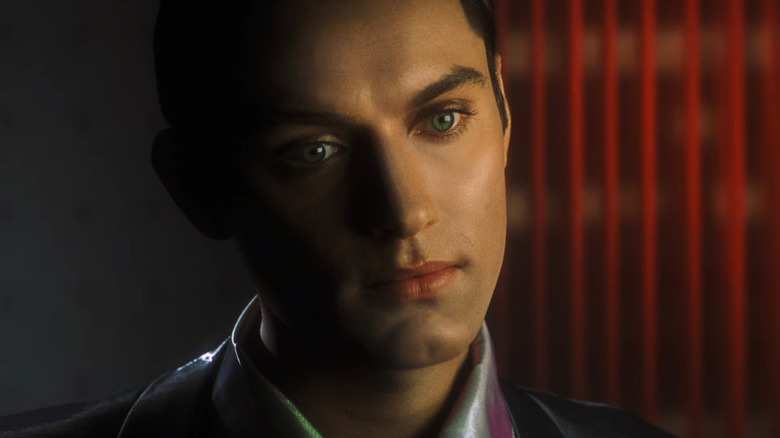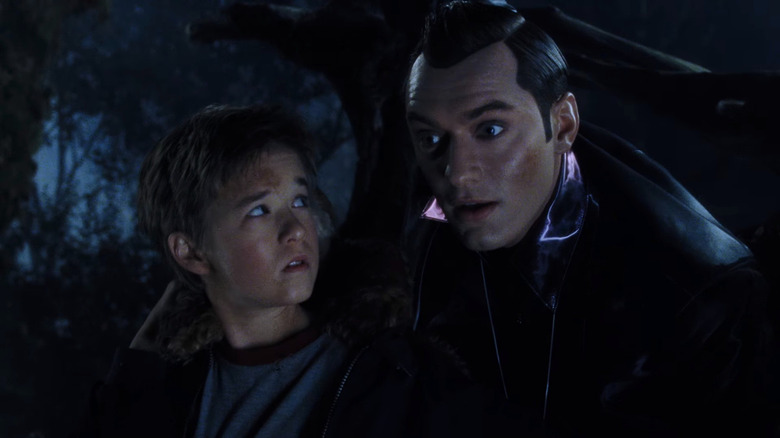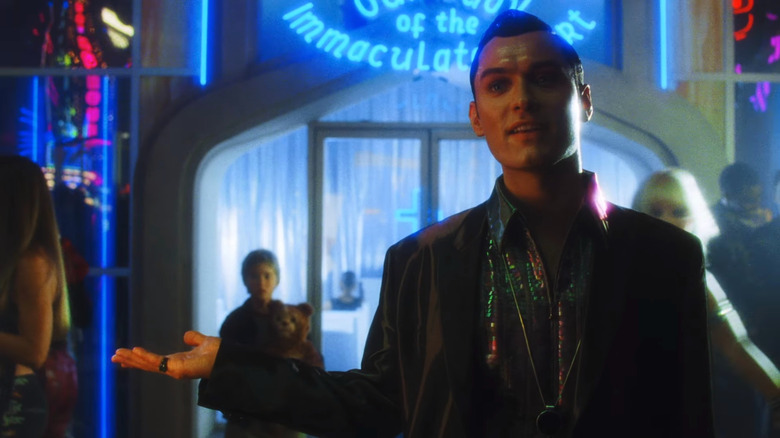Jude Law Studied Peacock Movements For A.I: Artificial Intelligence
The term "character actor" is a strange one. Generally, people are referred to as character actors if they do not fall within the traditional standards of attractiveness set by Hollywood, usually playing supporting parts to the leads. Someone like J.K. Simmons is a prototypical character actor. They are not defined by genre or era and can basically be plopped into any movie to play an outrageous character, an emotional grounding force, or just a utility player. Once in awhile, they will be enlisted to be the lead of a movie, but this is a rarity, as their stature within the industry keeps them solidly lower-billed than the movie stars.
What is strange about this conception of leading actors and character actors is, well, there really should not be a difference. An actor is an actor, after all. We have just been conditioned to believe that the pretty people should be front and center and the "less pretty" people orbit around them. On the one hand, it cuts out the opportunities for so many actors to be the drivers of their own stories based solely on physical appearance. On the other, it places a lot of these leading actors in a box that has their appearance dictate their worth rather than their acting ability. Hollywood will gladly crank out a bland movie with an attractive lead and hope that their look and charm will compensate for the thin character they have been given. Some actors do have that ineffable quality, but most actors require characters with a lot to latch onto to be effective on screen, as they are more interested in servicing the material than bolstering their own star persona.
One actor who exemplifies this dichotomy perfectly is Jude Law. He broke out in the late 1990s with performances in films like "Gattaca" and "The Talented Mr. Ripley," the latter earning him one of his two Oscar nominations. Two things were made incredibly clear by his appearances in these films: He was very talented and he was also one of the most glistening, beautiful people in the world. Naturally, he started becoming a leading man, and while Hollywood was convinced of this trajectory, he ended up not wearing that moniker all too well. What the filmmakers behind "Alfie" or "Enemy at the Gates" neglected to pick up on with those breakout performances is that Jude Law was, in fact, a weirdo character actor who just happened to be beautiful, and to Law's credit, he never stopped taking those choice supporting parts where he could maximize his impact as an actor. Where he could really shine was finding those parts where his attractiveness became was apart of the character's oddity. No film weaponized this blend better in his initial burst of stardom than in Steven Spielberg's tremendous 2001 film "A.I. Artificial Intelligence."
Finding the grace of an android
In "A.I. Artificial Intelligence," Jude Law plays the role of Gigolo Joe, a prostitute android on the run after being framed for murder. What makes the character unique is his lightness. Though the film takes place in the future, Steven Spielberg conceived the character to be one of "those old gigolos from the 1930s" with "tuxedo and tails." Joe uses elegance and grace to be seductive rather than anything outwardly raw. However, there is the added wrinkle that this is also a mechanical man, so all of his behavior is programmed and not inherent to him. Every gesture, every movement, every pose is just a little more exaggerated and forced than it should be. Gigolo Joe is a rather bizarre character that, if handled wrongly, could be disastrous. In preparation for the role, Law took to many different inspirations in crafting his physical behavior, and as he told Cinema.com, that included emulating some birds:
"He's a robot who is supposed to be really good at his job. So in terms of giving Joe an organic energy that mixed with his mechanical side, I studied mime, some dance and even peacock movements. As a robot who is programmed to display various kinds of seductive behavior, I had to be skillful in the art of attraction, and multiple transformations and physical movements to go along with that. So the intent was that I be a mixture of many things, and a combination of organic and plastic, and also romantic and futuristic."
For months prior to shooting, he also worked with veteran British choreographer Francesca Jaynes to incorporate these influences and develop specific dances and movements that Gigolo Joe would use in his everyday life, including simply walking down the street sometimes. They were primarily inspired by the dances of Fred Astaire and Gene Kelly. According to Law:
"Steven definitely wanted that dance movement, as part of Joe's seductive appeal. So I needed a certain amount of training, because I hadn't done much professional dancing in the past, beyond taking a few classes."
Subverting your looks
Gigolo Joe, in the world of "A.I. Artificial Intelligence," was designed to be a prototypical sex object. If you were to design something like that in 2001, chances are pretty strong you would look to Jude Law as inspiration. While at first glance he seems to be just handsome man Jude Law, the more you look at him ... the more something is off. His prettiness is almost unsettling. His hair line is a little too precise, his skin a little too shiny, and his jawline a little too cutting. This was all by design. In describing the creation of the character's look, Law said:
"At first they were going to give me prosthetic features for my entire face, but that idea was dropped as being too synthetic looking. What they settled on eventually, in order to retain some human element, was a prosthetic jaw. And also a kind of softened plastic facial makeup that would allow for facial expressiveness."
Many a handsome movie star would not go through all of this trouble to build a character like this. Plenty of them are confident enough in their own appearance and charisma that seeing the character name "Gigolo Joe" almost seems self explanatory. Jude Law is not built like that at all, though. This is a character actor performance by someone who is thought to be a traditional leading man. When Law is asked to play someone meant to be handsome, he will push it to the extreme, like in "The Talented Mr. Ripley" of "The Young Pope." He isn't just going to be an everyday handsome guy, because there is no fun in that. He wants to put in the effort, the research, and the preparation to properly convey what is on the page and in the mind of Steven Spielberg. Because he is given the space to do just that, he can create a truly memorable character, and I believe he should have been nominated for an Academy Award for his performance.
Jude Law has never let his character actor side go, and now that he is approaching 50 and his hairline has receded somewhat, people can seemingly appreciate that part of him better now. When you plug him into a meaty supporting part nowadays, you are guaranteed something you were not expecting and often brilliant, such as in "Anna Karenina," "Vox Lux," and "Contagion." Contemporaries like Colin Farrell, who would work on Spielberg's "A.I." follow-up "Minority Report," have also had to break looks in order to be considered great actors. It is such a shame that the filmmaking system has so thoroughly boxed in actors, limiting what they can be perceived as, when all that actually matters is the ability to convey the character that is on the page. An actor's abilities are not tied to their appearance. It's the preconceived notions about actors with certain physical features that holds everyone back.


